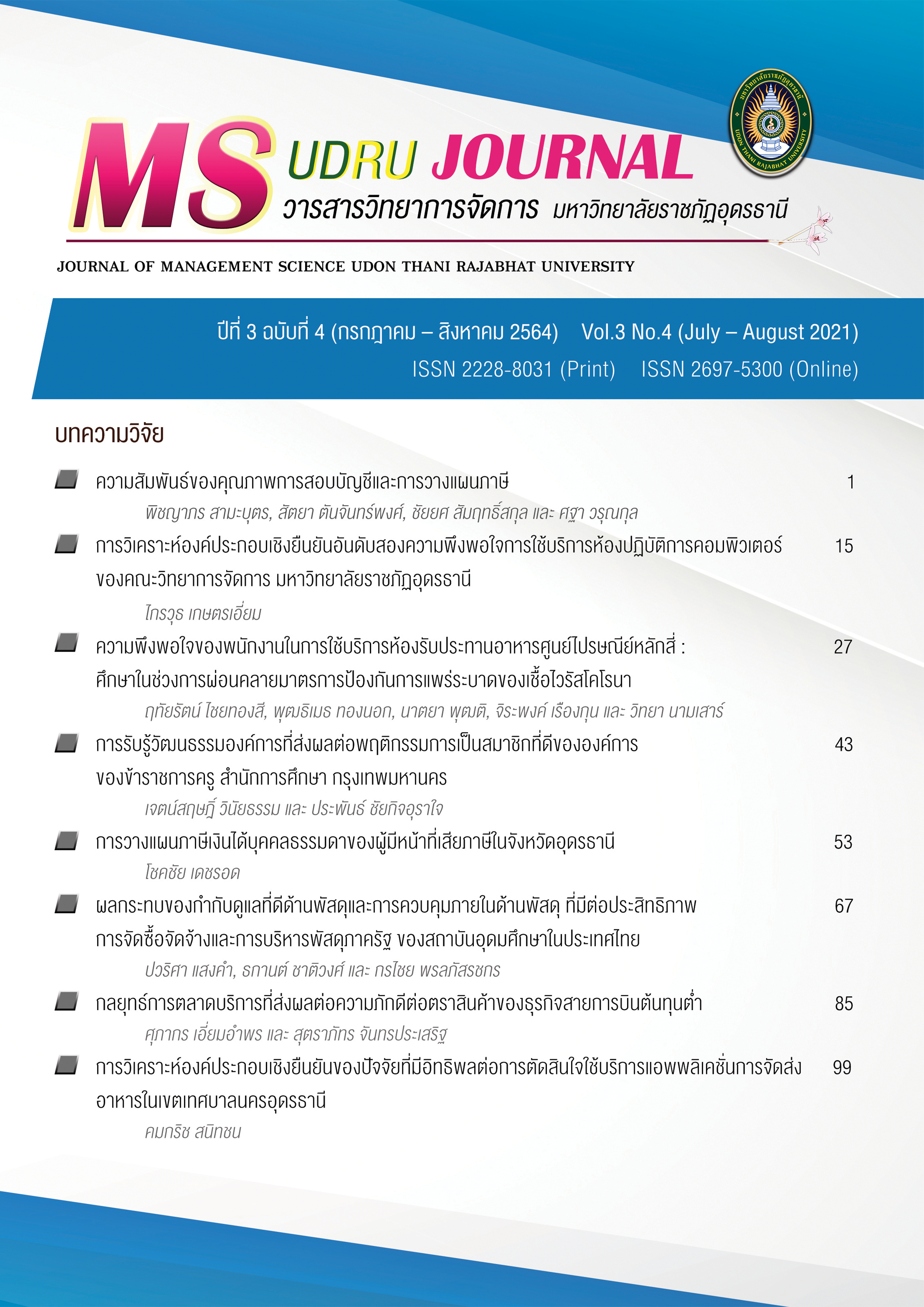ความสัมพันธ์ของคุณภาพการสอบบัญชีและการวางแผนภาษี ของบริษัทจดทะเบียนในตลาดหลักทรัพย์แห่งประเทศไทย
Main Article Content
บทคัดย่อ
งานวิจัยนี้มีวัตถุประสงค์เพื่อศึกษาความสัมพันธ์ระหว่างคุณภาพการสอบบัญชีกับการวางแผนภาษี ของบริษัทจดทะเบียนในตลาดหลักทรัพย์แห่งประเทศไทย ศึกษาจากรายงานประจำปีในระหว่างปี พ.ศ. 2556-2560 จำนวน 864 ตัวอย่าง โดยตัวแปรคุณภาพการสอบบัญชีวัดจาก ประเภทของสำนักงานสอบบัญชี ระยะเวลาในการให้บริการ การหมุนเวียนผู้สอบบัญชีรับอนุญาต และค่าธรรมเนียมการสอบบัญชี ส่วนการวางแผนภาษีวัดจากอัตราภาษีเงินได้ที่แท้จริง (ETR) และอัตราส่วนภาษีต่อสินทรัพย์รวม (TAX/ASSET) สถิติที่ใช้ในการวิเคราะห์ข้อมูลได้แก่ ค่าเฉลี่ย ส่วนเบี่ยงเบนมาตรฐาน ค่าประสิทธิ์สหสัมพันธ์ และวิเคราะห์สมการถดถอยเชิงพหุคูณ ผลการศึกษาพบว่า การหมุนเวียนผู้สอบบัญชี มีความสัมพันธ์เชิงลบกับการวางแผนภาษีอย่างมีนัยสำคัญทางสถิติ และค่าธรรมเนียมสอบบัญชีมีความสัมพันธ์เชิงบวกกับการวางแผนภาษีอย่างมีนัยสำคัญทางสถิติ
Article Details

อนุญาตภายใต้เงื่อนไข Creative Commons Attribution-NonCommercial-NoDerivatives 4.0 International License.
บทความที่ได้รับการตีพิมพ์เป็นลิขสิทธิ์ของคณะวิทยาการจัดการ มหาวิทยาลัยราชภัฏอุดรธานี
ข้อความที่ปรากฏในบทความแต่ละเรื่องในวารสารวิชาการเล่มนี้
ไม่ใช่ความคิดเห็นและความรับผิดชอบของผู้จัดทำ บรรณาธิการ กองบรรณาธิการ และคณะวิทยาการจัดการ มหาวิทยาลัยราชภัฏอุดรธานี ความรับผิดชอบด้านเนื้อหาและการตรวจร่างบทความแต่ละเรื่องเป็นความคิดเห็นของผู้เขียนบทความแต่ละท่าน
เอกสารอ้างอิง
กมล วานิชถาวร และพิเชษฐ์ โสภาพงษ์. (2562). ปัจจัยที่มีอิทธิพลต่อคุณภาพการตรวจสอบบัญชีของผู้สอบบัญชีรับอนุญาตแห่งประเทศไทย. วารสารมหาจุฬานาครทรรศน์, 6(9), 4332-4345.
น้ำทิพย์ ขำต้นวงษ์. (2558). ความสัมพันธ์ระหว่างการกำกับดูแลกิจการ กับการวางแผนภาษีของบริษัทจดทะเบียนในตลาดหลักทรัพย์แห่งประเทศไทย. กรุงเทพฯ: มหาวิทยาลัย ธรรมศาสตร์.
ธัญพร ตันติยวรงค์. (2552). การศึกษาปัจจัยที่มีอิทธิพลต่อการวางแผนภาษีและความสัมพันธ์ระหว่างการวางแผนภาษีกับมูลค่าของกิจการ: หลักฐานเชิงประจักษ์จากประเทศไทย. ปริญญาบัญชีดุษฎีบัณฑิต จุฬาลงกรณ์มหาวิทยาลัย.
สัตยา ตันจันทร์พงศ์. (2557). อิทธิพลของการกำกับดูแลกิจการที่ดีต่อการวางแผนภาษีที่ของบริษัทจดทะเบียนในตลาดหลักทรัพย์แห่งประเทศไทย. วารสารวิชาชีพบัญชี, 10(28), 5-18.
Hakim, I. H. & Omri, M. A. B. (2015). Auditor Quality and Tax Management: Evidence From Tunisian Companies. International Journal of Managerial and Financial Accounting, 7(2), 151-171.
Ichsani, S. & Susanti, N. (2019). The Effect of Firm Value, Leverage, Profitability and Company Size on Tax Avoidance in Companies Listed on Index LQ45 Period 2012-2016. Global Business and Management Research, 11(1), 307-313.
Kanagaretnam, K., Lee, J., Lim, C. Y. & Lobo, G. J. (2016). Relation between Auditor Quality and Tax Aggressiveness: Implications of Cross-country Institutional Differences. Auditing: A Journal of Practice & Theory, 35(4), 105-135.
Lestari, N. & Nedya, S. (2019). The Effect of Audit Quality on Tax Avoidance. International Conference On Applied Science and Technology 2019-Social Sciences Track (iCASTSS 2019). Atlantis Press.
Pummerer, E. & Steller, M. (2013). Taxes and Audit Quality. Retrieved October 20, 2020, from https://ssrn.com/abstract=2399045
Salehi, M., Tarighi, H. & Shahri, T. A. (2020). The Effect of Auditor Characteristics on Tax Avoidance of Iranian Companies. Journal of Asian Business and Economic Studies, 27(2), 119-134.
Stevens, J. P. (2012). Applied Multivariate Statistics for the Social Sciences. 5th ed. New York: Routledge.
Suyono, E. (2018). External Auditors’ Quality, Leverage, and Tax Aggressiveness: Empirical Evidence From The Indonesian Stock Exchange. Media Ekonomi dan Manajemen, 33(2), 99-112.


